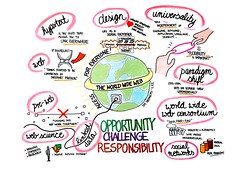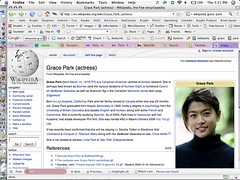August 15th, 2012 § § permalink


Tim Berners-Lee: The World Wide Web
I was curious about the total pageviews of the web. It turns out they are not really tracked anywhere, and that they are easy to estimate, so I did a quick analysis.
First I found two sources for ‘global total pageviews’:
- Akamai Net Usage Index – amazing real time dashboard of part of this data. They say that every minute 3 million pageviews are spent on news sites, and 10 million on social sites. That’s friggin’ a lot of pageviews! But I wanted to know the grand total, and hopefully get some sense on where the blogs are in the picture.
- blog post about interpolating this data from Alexa. Nice approach, but a few years old data, so I decided to repeat the process.
Alexa publishes pageviews for every site for free as a % of global pageviews. First thing to do was estimate the grand total, as described in that blog post, by looking at the published data from Wikipedia.
11,600,000,000 / 0.5% = 2320,000,000,000 monthly total pageviews on the Web
… told you it was easy 🙂 but that just means we can dig deeper. Alexa publishes the list of top million sites in a downloadable text file, so I wrote a script to go trough it, scrape Alexa pages for top 10.000 sites and store their individual traffic shares.
» Read the rest of this entry «
March 27th, 2012 § Comments Off on Disconnect: another service to protect our privacy? § permalink


A heart-shaped cookie (Photo credit: Wikipedia)
Privacy is a funny thing.
Online, we want search engines to show us best possible results, Facebook to amuse us with most intriguing stories from our friends, and yet we are afraid that they are ‘stealing’ our data with cookies.
I guess this disconnect of expectations happens because we are intimately convinced, that the world revolves around us, and that the ‘most relevant result’ has nothing to do with me as an individual, so why would they possibly need MY data, don’t they have enough from everyone else already?
TechCrunch :: In the age of endless sharing, super cookies, social search results, and that ever-present social graph, it’s comforting to know that there are some who are still prioritizing privacy. (And a few of them are former Googlers no less!
via: www.nextlevelofnews.com
Supposedly in Netherlands, people don’t use shades on windows, because “windows are for looking out, not in”, and in NY, it’s sometimes considered rude to use shades that prevent neighbors use their binoculars.
March 19th, 2012 § § permalink


My Grace Park Photo On Wikipedia (Photo credit: kk+)
I am surprised, more and more often, by really well written Wikipedia pages for very obscure people and services.
I so far assumed they are written by themselves, or rather a PR professional on their behalf.I just couldn’t believe there is enough people who care about XX to properly maintain that article, and even have it much more elaborate than for instance the one about YY.
Also, my favorite trick to use for content-based pet projects in Slovenia is, to contribute part of the content to an under resourced Wikipedia, and cite the new project as the source. Everybody wins.
So I guess I’m surprised that Wikipedia is not under attack by mercenaries who should know everything about content business. It might be that Wikipedians are such merciless defenders of the shrine, that nobody evil dares to touch it. 😉
PR News Poll: Wikipedia Mostly Unexplored By PR Pros By Bill Miltenberg, PR News There’s been an ongoing debate between leading PR pros and Wikipedia founder Jimmy Wales about PR’s participation in the creation and editing of Wikipedia posts. Wales says that objectivity and transparency is lacking among PR pros, especially within agencies.
via: www.prnewsonline.com
I think it’s a fascinating topic, and one we will hear more about this year, as the content marketing goes mainstream. What if Wikipedians were paid to edit Wikipedia full time?
March 14th, 2012 § Comments Off on Creative is in Detail § permalink


Image via Wikipedia
I spent some time last weekend creating my first e-book. I’ve done hardcopy books before, but e-pub is a new thing for me.
Converting couple thousand pages of text into a book that I can read on my iPhone was fun, and it remembered me just how much work goes into getting all the details just right. If you don’t do them, it’s not a book anymore – table of contents, named index, both cross-linked to correct pages, cover design, font sizes, headers and footers,… as a reader, i really appreciate these ‘features’, and I miss them when they are not in.
As I was programming these features (because doing it manually in some Adobe software would be just too long give the size of the book), I realized that it’s not much different than programming a web site – getting core content online is easy, but these days to actually call it a website, it has to have so many more features working hand in hand with the content, that it takes 5x longer to do it than it did 10 years ago.
and I realized it’s the same with any creative industry / work – there’s so many details in every good picture or motion picture, that a random viewer can’t really grasp, but she will nevertheless recognize ‘good’ from ‘bad’ based on them. Print is just the oldest ‘industrialized’ creative industry, and web the youngest.
This is why this is sad news – there will never be as much effort put into making such large volume so useful, as EB was for over 200 years.
Encyclopaedia Britannica will stop publishing print editions and go digital-only – a huge step for the encyclopedia which has been in print since 1768. The sales of Britannica print editions has been on the decline since 1990, when 120,000 32-volume sets were sold.
via: mashable.com
March 12th, 2012 § Comments Off on The Internet: It’s like Real Life, Only With Buttons § permalink


Image via Wikipedia
the article is actually about SEO and designing buttons, so not really what i was hoping for, but i really love the title:
Every time I read about social media these days, I end up hearing about how social sharing metrics are becoming a bigger factor in everything from organic rankings to driving additional clicks from visitors already on your site. And it makes total sense.
via: searchengineland.com
… it expresses without hesitation the promise of the web, and what it actually is striving for – reinvent and emulate everything that makes us humans. just think of all the catchy buzzwords flying around past two decades: shopping, socializing, mobility, expression, gaming… it almost reads like titles of books on philosophical anthropology at the beginning of 20th century: homo faber, homo ludens, homo creator, homo socius… (full list)
if only we were more aware of the similarities and not reinvent the wheel all the time.
January 18th, 2012 § § permalink


Image by captsolo via Flickr
a couple of weeks ago i downloaded large part of wikipedia into my chrome. it felt a bit excessive experiment at that point, but, today, as we are experiencing wikipedia blackout, it actually came in extremely handy. feels weird to live in a world where having a local copy of a website is the only way to do business. feels like nineties all over again. fuck you SOPA.
January 9th, 2009 § Comments Off on Ongoing Conflicts in the World § permalink

While listening to shocking reports from Gaza I started to imagine a true online newspaper of the future. Since navigating information and additional information became so simple, I expect my paper to be a structured aggregate of knowledge, not just the most appealing news resource. On ‘world affairs’ section, I want to see all wars that are going on in the world today and browse trough their histories, so that I can create my opinion about it based on facts. I don’t want to live in a media-constructed reality thinking that there is only one good and one evil at each moment.
And this morning, I entered the search term into the engine: “wars going on in the world”, and was pleasantly surprised – Wikipedia has this page called Ongoing Conflicts, summarizing exactly what I was looking for, including a map. This is not the first time Wikipedia had some obscure idea of mine already included, and each time this happens, I get a nice feeling of at least something moving in the right direction in this world – collaborative encyclopedia can really be the groundworks for many amazing applications of the future. The web is still young.






















![Reblog this post [with Zemanta]](http://img.zemanta.com/reblog_c.png?x-id=1352ecb9-94bc-4e1b-82e1-e6d7dbac7f77)